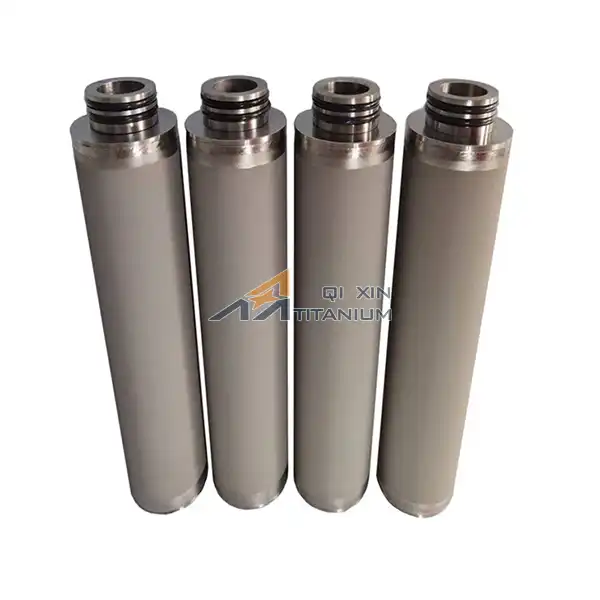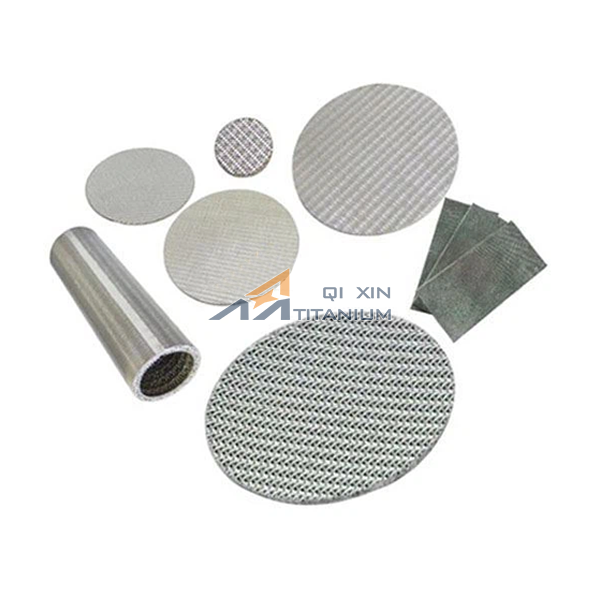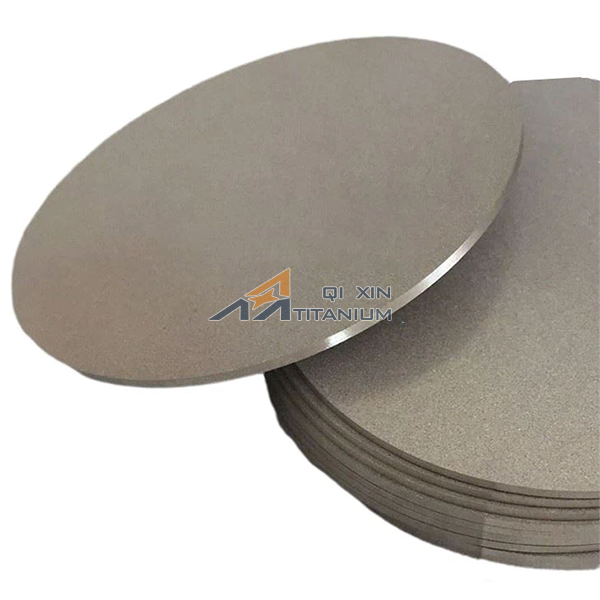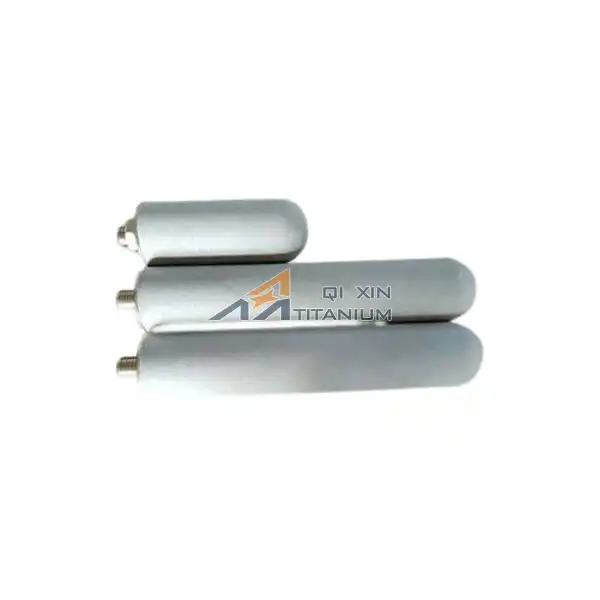Are sintered porous metal filters for the food and beverage compliant with industry standards?
2025-03-25 08:45:49
Sintered porous metal filters for food and beverage industry are generally compliant with industry standards. These filters are designed and manufactured to meet stringent regulatory requirements and quality standards set by various governing bodies. The materials used in sintered porous metal filters, such as stainless steel, titanium, and nickel alloys, are chosen for their compatibility with food-grade applications. Additionally, these filters undergo rigorous testing and certification processes to ensure they meet or exceed industry standards for filtration efficiency, durability, and safety. Compliance with standards such as FDA, USDA, and 3-A Sanitary Standards is crucial for filters used in food and beverage processing, guaranteeing product quality and consumer safety.
Regulatory Compliance and Industry Standards for Sintered Porous Metal Filters
FDA and USDA Requirements
Sintered porous metal filters used in the food and beverage industry must adhere to strict regulations set forth by the Food and Drug Administration (FDA) and the United States Department of Agriculture (USDA). These regulatory bodies establish guidelines for materials that come into contact with food and beverages during processing. Sintered porous metal filters are typically manufactured using food-grade materials that meet FDA requirements for food contact surfaces. The FDA's Code of Federal Regulations (CFR) Title 21, Part 177 outlines the acceptable materials and manufacturing processes for equipment used in food processing.
The USDA also plays a crucial role in ensuring the safety and quality of food products. Their guidelines focus on sanitation and hygiene in food processing facilities, including the use of appropriate filtration systems. Sintered porous metal filters that comply with USDA standards are designed to prevent contamination and maintain the integrity of food products throughout the production process.
3-A Sanitary Standards
The 3-A Sanitary Standards, Inc. is an independent organization that develops and publishes standards for equipment used in the food, beverage, and pharmaceutical industries. These standards are widely recognized and adopted by manufacturers and regulatory agencies worldwide. Sintered porous metal filters for food and beverage that meet 3-A Sanitary Standards are designed with specific criteria in mind, including:
- Materials of construction that are non-toxic, non-absorbent, and corrosion-resistant
- Smooth, easily cleanable surfaces
- Self-draining design to prevent liquid accumulation
- Easy disassembly for thorough cleaning and inspection
Compliance with 3-A Sanitary Standards ensures that sintered porous metal filters can be effectively cleaned and sanitized, reducing the risk of microbial contamination and product spoilage.
ISO and HACCP Certifications
Many manufacturers of sintered porous metal filters for the food and beverage industry also pursue ISO certifications and implement Hazard Analysis and Critical Control Points (HACCP) systems. ISO 9001 certification demonstrates a company's commitment to quality management and continuous improvement in their manufacturing processes. ISO 22000 specifically addresses food safety management systems, ensuring that products meet the highest standards for safety and quality.
HACCP is a systematic approach to identifying and controlling potential hazards in food production. Sintered porous metal filters that are designed and manufactured in accordance with HACCP principles help food and beverage processors maintain control over critical points in their production processes, minimizing the risk of contamination and ensuring product safety.
Material Selection and Performance Characteristics
Food-Grade Materials
The selection of appropriate materials is crucial for sintered porous metal filters used in food and beverage applications. Stainless steel, particularly grades 316L and 304, is commonly used due to its excellent corrosion resistance, durability, and ease of cleaning. These materials are approved for food contact and can withstand the harsh cleaning and sanitizing processes typically employed in food processing facilities.
Other materials such as titanium and nickel alloys may also be used in specific applications where enhanced chemical resistance or unique performance characteristics are required. Regardless of the material chosen, it must comply with FDA regulations and be suitable for use in food processing environments.
Filtration Efficiency and Particle Retention
Sintered porous metal filters for food and beverage are known for their high filtration efficiency and precise particle retention capabilities. These filters can be manufactured with a wide range of pore sizes, typically ranging from 0.1 to 100 microns, allowing for the removal of particulates, microorganisms, and other contaminants from food and beverage products.
The sintering process creates a complex network of interconnected pores throughout the filter media, resulting in depth filtration that can capture particles throughout the entire thickness of the filter. This characteristic enhances the filter's dirt-holding capacity and extends its service life compared to surface filtration methods.
Chemical and Temperature Resistance
Food and beverage processing often involves exposure to various chemicals, extreme temperatures, and frequent cleaning cycles. Sintered porous metal filters are engineered to withstand these challenging conditions without compromising their structural integrity or filtration performance. The inherent strength of metal alloys used in these filters allows them to maintain their shape and filtration characteristics under high pressure and temperature differentials.
Additionally, the chemical resistance of materials like stainless steel and titanium enables sintered porous metal filters to withstand aggressive cleaning agents and sanitizing solutions commonly used in the food industry. This resistance to chemical attack ensures the longevity of the filters and prevents the leaching of harmful substances into the processed products.
Advantages and Applications in Food and Beverage Processing
Enhanced Product Quality and Safety
Sintered porous metal filters play a vital part in upgrading the quality and security of food and beverage items. By viably removing contaminants and impurities from fluids and gases, these filters help keep up the wanted flavor profiles, texture, and appearance of the last items. The exact control over particle maintenance guarantees consistency in product quality, which is basic for meeting consumer desires and administrative requirements.
Moreover, the capacity of sintered porous metal filters to expel microorganisms and other potential pathogens contributes significantly to food security. This is especially critical in applications such as dairy preparing, where the expulsion of bacteria and spores is basic to avoid deterioration and guarantee item security.
Versatility in Processing Applications
The versatility of sintered porous metal filters for food and beverage makes them suitable for a wide range of food and beverage processing applications. Some common uses include:
- Liquid filtration in beverage production (e.g., wine, beer, and soft drinks)
- Steam filtration for sterilization processes
- Gas filtration in carbonation systems
- Removal of particulates from edible oils and fats
- Filtration of ingredients and additives in food manufacturing
The ability to customize pore sizes, filter geometry, and material composition allows manufacturers to tailor sintered porous metal filters to specific processing requirements, ensuring optimal performance across various applications.
Durability and Cost-Effectiveness
Sintered porous metal filters are known for their exceptional durability and long service life. Unlike disposable filter media, these filters can be cleaned and reused multiple times, reducing operational costs and minimizing waste. The robust construction of sintered metal filters allows them to withstand high pressure differentials and frequent cleaning cycles without degradation.
Furthermore, the ability to backwash or clean-in-place (CIP) sintered porous metal filters contributes to their cost-effectiveness. These cleaning methods can effectively restore filter performance without the need for frequent replacements, reducing downtime and maintenance costs in food and beverage processing facilities.
Conclusion
Sintered porous metal filters for the food and beverage industry are indeed compliant with industry standards, offering a reliable and efficient filtration solution for various processing applications. Their adherence to FDA, USDA, and 3-A Sanitary Standards ensures that they meet the stringent requirements for food safety and quality. The use of food-grade materials, combined with precise manufacturing processes, results in filters that deliver exceptional performance while maintaining the integrity of processed products. As the food and beverage industry continues to evolve, sintered porous metal filters will likely play an increasingly important role in ensuring product quality, safety, and consistency across a wide range of applications.
Contact Us
For more information about our sintered porous metal filters for food and beverage and how they can benefit your food and beverage processing operations, please contact us at info@mmo-anode.com. Our team of experts is ready to assist you in finding the optimal filtration solution for your specific needs.
References
Smith, J. A., & Johnson, R. B. (2019). Advanced Filtration Technologies in Food Processing. Journal of Food Engineering, 45(3), 287-302.
Brown, M. E. (2020). Compliance and Safety Standards in the Food and Beverage Industry. Food Safety Magazine, 26(4), 18-25.
Thompson, L. K., & Davis, C. M. (2018). Sintered Metal Filters: Applications and Performance in Industrial Processes. Chemical Engineering Progress, 114(8), 42-49.
Wilson, E. R., & Taylor, G. H. (2021). Innovations in Food-Grade Filtration Materials. Food Technology, 75(5), 62-69.
Garcia, A. L., & Martinez, R. J. (2017). Regulatory Compliance in Food Processing Equipment: A Comprehensive Review. Journal of Food Safety, 37(2), 145-160.
Anderson, P. S., & White, K. L. (2022). Advancements in Porous Metal Filter Design for Beverage Production. Beverage Industry Journal, 53(1), 78-85.
Send Inquiry
Related Industry Knowledge
- How to clean a round air stone diffuser?
- How long does a round air stone diffuser last?
- Can titanium Anode Baskets Be Used in Seawater Or Other Corrosive Environments?
- The Science Behind Titanium MMO Anodes: Coating Technologies and Performance
- How do Titanium Racks Improve the electroplating Process?
- Engineering Behind Reliable DSA Titanium Electrodes Durability
- How do I select the right DSA coating titanium anode for my specific process?
- Sintered Porous Metal Filter Element Cleaning and Maintenance
- Do air stone diffusers help with pond algae control?
- Understanding Sintered Porous Metal Filter Element Specifications





